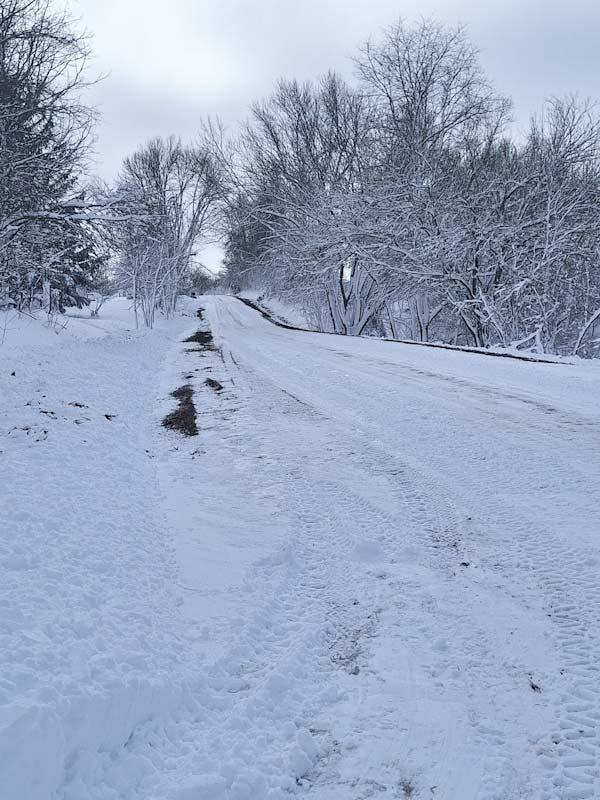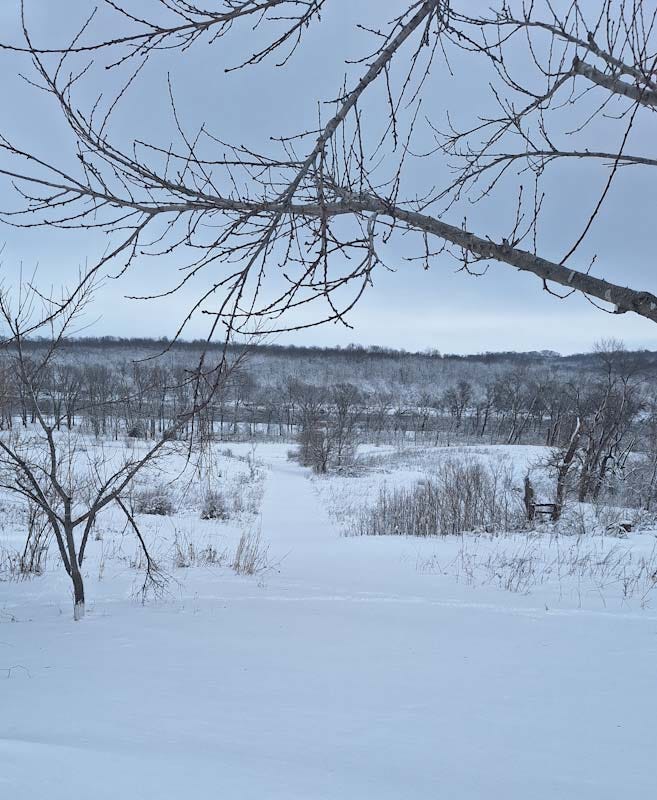There’s a farmer with a new house and huge machine shed about halfway between our place and Tipton, the county seat 15 miles away. A couple of years ago, his shed got hit by a tornado. For a year, busted joists and twisted metal lay strewn across the yard, exposed to the elements. When I drove by, I could see an interior wall that kept half of it still in use. I wondered how he could let all that good lumber go to waste when he had a place to store it.
I could’ve used some of that wood for the outhouses I was building, so I left a note on the guy’s door offering to help clean up the mess in trade for some wood. He called and said I could come get it. By the time I showed up that day pulling a trailer with my Subaru – instead of a pickup he might’ve respected more – he’d decided he needed it all except some little scraps he’d pushed into a pile of bent nails. He explained he was waiting on the insurance to rebuild. (So, the wood was paid for, he claimed he was going to use it, but he hadn’t even moved it out of the weather.) He warned me to watch out for the nails, then climbed into his shiny new tractor parked next to his shiny new combine and drove off into his field.
That was a warm, sunny day last Spring, but I think about him on days like this when we’ve got a foot of snow on the ground, more coming down and temps dropping below zero. It’s times like these I appreciate my neighbors the most, even though we haven’t done much more than wave in passing since it turned cold. Sure, we can plow our own driveways and we’ve got firewood laid in, but we’re all still one long power outage or one quick heart attack away from saving each other’s lives.
Out here on Franklin Ave., my new young neighbor cut down some dead trees for us, because he’s better with a chainsaw than I am and dead trees are tricky to drop. We gave him a Christmas tree from our stand and his kids will be sledding down our hill soon. He hunts rabbit and deer, which feeds his family and provides rodent control for us. All summer long, another neighbor stops by on her way to the food pantry to offer us extra veggies because she sees – though would never say it - that I’m a lost cause when it comes to gardening. She and her husband have been living at the end of the road for more than 40 years. There isn’t much I can offer in return, but she knows I try.
For one brief moment in time, we valued the ones who showed up more than the ones who were in it for themselves.
Neighborliness like that is obsolete with Scrap Wood Guy. He’s got enough money to pay for anything he needs. He’s even immune to the weather, I guess.
He’s the kind of Iowa farmer who has thrived as a result of the Farm Crisis. I’ve met scores of them over the years. He believes his success is due to his entrepreneurial skills, his belief in individual responsibility and his traditional family values, whatever those are. He has a right as an American Farmer to government payments, subsidized insurance and a 100 percent tax deduction for his farm equipment because they reduce the inherent risks that come with farming.
And because he’s so savvy, he’s turned that risk into profit and a pretty nice lifestyle. One lousy tornado’s not going to slow him down. In fact, it’s going to net him a little extra lumber to make toys for the grand kids. He might use some of it to make a “Get the Government Off Our Backs” billboard to post at the end of his driveway.
No wonder these guys don’t believe they’re causing climate change.
One by-product of the 1980’s fight to save the family farm was that farmers learned, if before they’d only suspected, which neighbors showed up for each other and which were just in it for themselves. For one brief moment in time, we valued the ones who showed up more than the ones who were in it for themselves.
My generation lost that fight, so now I look to the future, to small-scale, next generation farmers this guy probably disdains. They grow what he’d call “gardens” (that fed us during Covid when no one else could.) The smart ones ask their new rural neighbors for help fixing their tractor or putting on chains for winter. They return those favors with boxes of fresh vegetables or by fixing a gutter. When these young farmers can step out of their suburban upbringing and their rural neighbors can respond with compassion and generosity of spirit, they all set a rather nice table for the future. It’s happening all across Iowa. It gives me hope.
Being neighborly isn’t a challenge or an inconvenience. It’s not old-fashioned or obsolete. It’s priceless.
Practical Farmers of Iowa is a great place for transplanted young farmers to learn from older farmers of all kinds
Country - THE 1984 movie that illustrated the farm crisis
King Corn - Learn about the subsidies mentioned above from a journey by a couple of friends







Being neighborly is indeed priceless. Wherever you live. Thank you for this thoughtful essay and the reminder. I agree about farming: there are the big-ag farmers who farm the government and the farmers who are actually raising food for us to eat. I hope the latter eventually outnumber or at least educate the former.
Thank you Suzan. You reminded me to hunt down my copy of King Corn to share with friends. Wendell Berry stated it well when noted that many farmers would rather have the land rather than a neighbor. The isolation in the countryside increases as people leave. I hope a new generation of farmers will occupy the land before I am done with my lifetime of work.